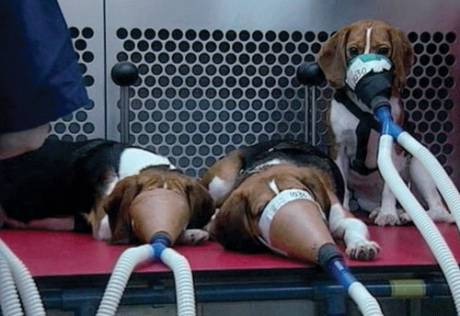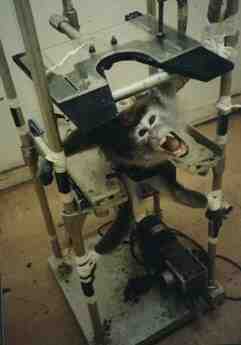Debate with Dr. Roger Yates: “That this house would ban vivisection.” NUI Galway, Thursday 20th, 7p
 galway |
animal rights |
press release
galway |
animal rights |
press release  Saturday November 15, 2008 11:21
Saturday November 15, 2008 11:21 by ALiberation - ALiberation
by ALiberation - ALiberation aliberationnow at gmail dot com
aliberationnow at gmail dot com www.vegaplanet.org
www.vegaplanet.org 0863203643
0863203643
Animal Rights not Human Wrongs!
Debate: NUIG Literary & Debating Society
Motion: “That this house would ban vivisection”
Dr. Roger Yates will be debating at the Literary & Debating Society of the National University Ireland of Galway. In a motion by the Literary and Debating Society, “That this house would ban vivisection.” Dr. Yates will examine the use of animals in human-nonhuman relations, our dysfunctional way of seeing them as property, and our failure to respect their rights. Yates is inspired by the writing and activism of law professor and philosopher Gary L. Francione (www.abolitionistapproach.com)
Debate: NUIG Literary & Debating Society
Motion: “That this house would ban vivisection”
Dr. Roger Yates will be debating at the Literary & Debating Society of the National University Ireland of Galway. In a motion by the Literary and Debating Society, “That this house would ban vivisection.” Dr. Yates will examine the use of animals in human-nonhuman relations, our dysfunctional way of seeing them as property, and our failure to respect their rights. Yates is inspired by the writing and activism of law professor and philosopher Gary L. Francione (www.abolitionistapproach.com)
What: A debate on the motion “That this house would ban vivisection”
When: Thursday, 20th November
Time: 7pm
Where: Kirwan Theatre, NUIG, University Road, Galway, Ireland.
Speakers:
Dr. Roger Yates,
Mr. Alistair Currie from PETA,
Mr. Iain Simpson from Pro-Test
And a member of NUIG
Contact: Jim of ALiberation
Email: aliberationnow@gmail.com
Phone: 086 3203643
Website: www.vegaplanet.org
An animal dies in an EU lab every three seconds.
If vivisection ‘worked’ would that matter? In Nazi Germany, different groups of people were used for experimentation from testing mustard gas to freezing experimentations; from incendiary bomb experiments to literally sewing twins together to try to create conjoined twins.
The people used (Jews, Roma, homosexuals and others) were seen as inferior and, thus, their rights were not respected. Yet these experiments had a lot more value than experiments using nonhuman animals. They ‘worked’ in the sense of providing valid data. Yet, the provision of valid data is not the only criterion by which we judge such experiments. Were they ethical?
Animals, today, are seen as inferior. Animals used in experimentation may be poisoned; deprived of food, water or sleep; applied with skin and eye irritants; subjected to psychological stress; deliberately infected with disease; brain damaged; paralysed and surgically mutilated; irradiated; burned; gassed; force fed and electrocuted. They are subjected to myriad forms of physical deformity as well as more subtle forms of suffering. Researchers around the world use animals to test or develop almost anything from household products, cosmetics and food additives to pharmaceuticals, industrial chemicals, agrochemicals, pet foods, medical devices and tobacco and alcohol products. From military tests to mere curiosity, nonhuman animals are treated as a disposable commodity. They are seen as property. Property which do not have rights. Is this ethical?
Today all other animals have moral rights that are not respected by the law. The law confers legal rights on humans but not on nonhuman animals. In any conflict between human and nonhuman animals, the interests of the human are upheld over the nonhuman animal. The law respects human rights but does not respect nonhuman animal rights. Even where the interests of humans are trivial and the interest of nonhuman animals are significant or life dependent, the interest of the human will triumph in the law.
Dr. Roger Yates will be debating at the Literary & Debating Society of the National University Ireland of Galway. In a motion by the Literary and Debating Society, “That this house would ban vivisection.” Dr. Yates will examine the use of animals in human-nonhuman relations, our dysfunctional way of seeing them as property, and our failure to respect their rights. Yates is inspired by the writing and activism of lawyer and philosopher Gary L. Francione (www.abolitionistapproach.com)
The pharmaceutical industry is one of the richest and most powerful industries in the world. Their use of animals, they suggest, is strictly regulated. However this regulation does not translate into respecting animal rights or human rights. Instead these regulations are more concerned about giving legal protection to pharmaceutical corporations.
Legal rights are recognized in a corporation – a thing with no sentience (ability to feel) - but denied to a living animal who has sentience.
Vivisection does not work, unless those who are tested on and those who the searched cure is for are from the same species.
(1) Less than 2% of human illnesses (1.16%) are ever seen in animals.
(2) According to the former scientific executive of Huntingdon Life Sciences, animal tests and human results agree only '5%-25% of the time'.
(3) 95% of drugs passed by animal tests are immediately discarded as useless or dangerous to humans.
http://www.vivisection-absurd.org.uk/33facts.html
Why has the effectiveness of animal tests never been measured against a panel of state-of-the-art techniques based on human biology? Why not take up the challenge of Safer Medicines Campaign (an independent patient safety organisation of doctors and scientists)?
The Challenge
A sample of ten or more drugs which are, or have been, on the market (for which we therefore already have both clinical data and animals used in experimentation data) should be put through a battery of the newer tests offered by a range of companies, which could be selected by tender. A statistical review of all the available data: human, animal and new test-derived, should then be conducted. The battery should be flexible, to take account of the varying worth of different tests depending on the type of disease or drug under investigation, but should include the following as a minimum: Tissue Cultures, Human Tissues, DNA Chips, Computer Modeling, Testing for Birth Defects, Microdosing
http://www.curedisease.net/evaluationproposal.shtml
What are the pharmaceutical companies afraid of?
For the answer please see:
http://www.vivisection-absurd.org.uk/errors.html
More Information:
http://human-nonhuman.blogspot.com/
www.abolitionistapproach.com
www.humanemyth.org
www.shac.net
www.curedisease.net
www.vivisection-absurd.org.uk
If we are serious about stopping cruelty then we need to be serious about Rights!

